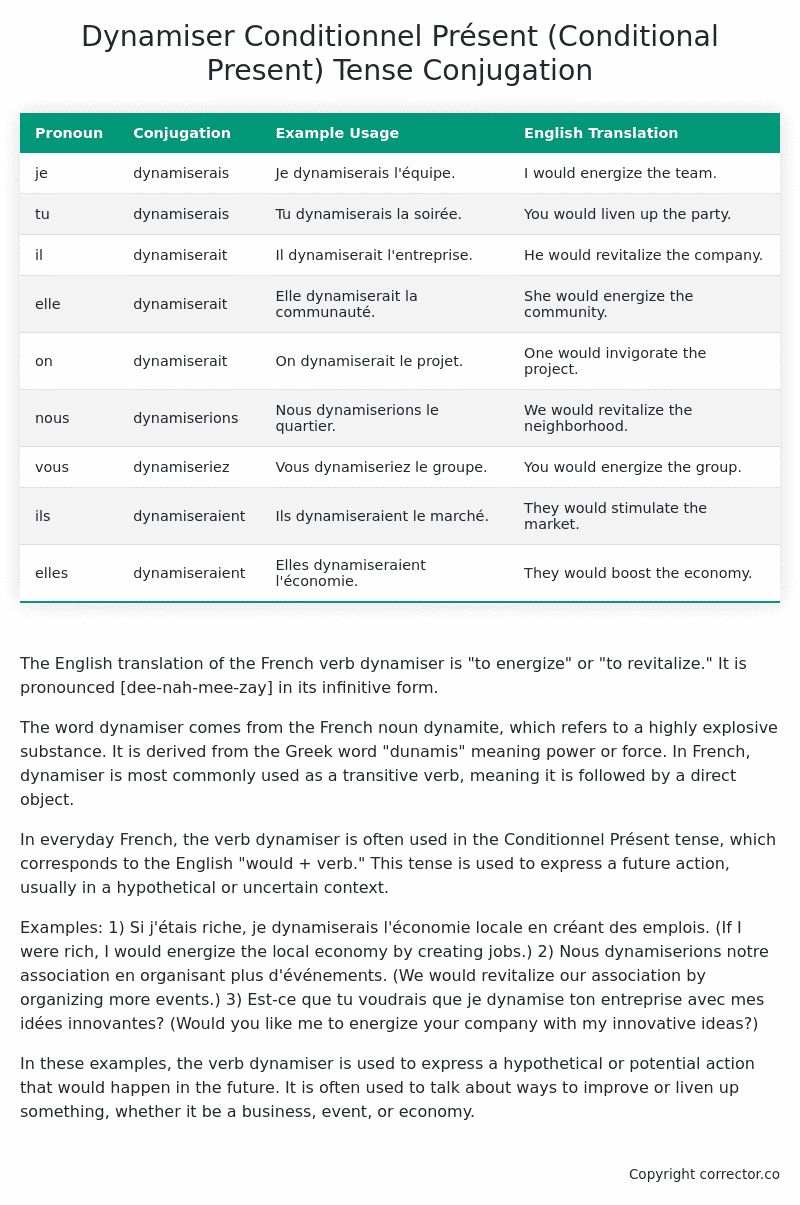Conditionnel Présent (Conditional Present) Tense Conjugation of the French Verb dynamiser
Introduction to the verb dynamiser
The English translation of the French verb dynamiser is “to energize” or “to revitalize.” It is pronounced [dee-nah-mee-zay] in its infinitive form.
The word dynamiser comes from the French noun dynamite, which refers to a highly explosive substance. It is derived from the Greek word “dunamis” meaning power or force. In French, dynamiser is most commonly used as a transitive verb, meaning it is followed by a direct object.
In everyday French, the verb dynamiser is often used in the Conditionnel Présent tense, which corresponds to the English “would + verb.” This tense is used to express a future action, usually in a hypothetical or uncertain context.
Examples:
1) Si j’étais riche, je dynamiserais l’économie locale en créant des emplois. (If I were rich, I would energize the local economy by creating jobs.)
2) Nous dynamiserions notre association en organisant plus d’événements. (We would revitalize our association by organizing more events.)
3) Est-ce que tu voudrais que je dynamise ton entreprise avec mes idées innovantes? (Would you like me to energize your company with my innovative ideas?)
In these examples, the verb dynamiser is used to express a hypothetical or potential action that would happen in the future. It is often used to talk about ways to improve or liven up something, whether it be a business, event, or economy.
Table of the Conditionnel Présent (Conditional Present) Tense Conjugation of dynamiser
| Pronoun | Conjugation | Example Usage | English Translation |
|---|---|---|---|
| je | dynamiserais | Je dynamiserais l’équipe. | I would energize the team. |
| tu | dynamiserais | Tu dynamiserais la soirée. | You would liven up the party. |
| il | dynamiserait | Il dynamiserait l’entreprise. | He would revitalize the company. |
| elle | dynamiserait | Elle dynamiserait la communauté. | She would energize the community. |
| on | dynamiserait | On dynamiserait le projet. | One would invigorate the project. |
| nous | dynamiserions | Nous dynamiserions le quartier. | We would revitalize the neighborhood. |
| vous | dynamiseriez | Vous dynamiseriez le groupe. | You would energize the group. |
| ils | dynamiseraient | Ils dynamiseraient le marché. | They would stimulate the market. |
| elles | dynamiseraient | Elles dynamiseraient l’économie. | They would boost the economy. |
Other Conjugations for Dynamiser.
Le Present (Present Tense) Conjugation of the French Verb dynamiser
Imparfait (Imperfect) Tense Conjugation of the French Verb dynamiser
Passé Simple (Simple Past) Tense Conjugation of the French Verb dynamiser
Passé Composé (Present Perfect) Tense Conjugation of the French Verb dynamiser
Futur Simple (Simple Future) Tense Conjugation of the French Verb dynamiser
Futur Proche (Near Future) Tense Conjugation of the French Verb dynamiser
Plus-que-parfait (Pluperfect) Tense Conjugation of the French Verb dynamiser
Passé Antérieur (Past Anterior) Tense Conjugation of the French Verb dynamiser
Futur Antérieur (Future Anterior) Tense Conjugation of the French Verb dynamiser
Subjonctif Présent (Subjunctive Present) Tense Conjugation of the French Verb dynamiser
Subjonctif Passé (Subjunctive Past) Tense Conjugation of the French Verb dynamiser
Subjonctif Imparfait (Subjunctive Imperfect) Tense Conjugation of the French Verb dynamiser
Subjonctif Plus-que-parfait (Subjunctive Pluperfect) Tense Conjugation of the French Verb dynamiser
Conditionnel Présent (Conditional Present) Tense Conjugation of the French Verb dynamiser (this article)
Conditionnel Passé (Conditional Past) Tense Conjugation of the French Verb dynamiser
L’impératif Présent (Imperative Present) Tense Conjugation of the French Verb dynamiser
L’infinitif Présent (Infinitive Present) Tense Conjugation of the French Verb dynamiser
Struggling with French verbs or the language in general? Why not use our free French Grammar Checker – no registration required!
Get a FREE Download Study Sheet of this Conjugation 🔥
Simply right click the image below, click “save image” and get your free reference for the dynamiser Conditionnel Présent tense conjugation!

Dynamiser – About the French Conditionnel Présent (Conditional Present) Tense
Formation
Common Everyday Usage Patterns
Expressing Polite Requests
Expressing Hypothetical Situations
Expressing Doubt or Uncertainty
Interactions with Other Tenses
Present Tense
Past Tense
Future Tense
Conditional Perfect
Summary
Want More?
I hope you enjoyed this article on the verb dynamiser. Still in a learning mood? Check out another TOTALLY random French verb conjugation!


